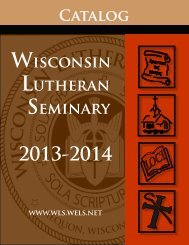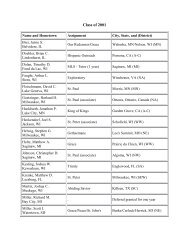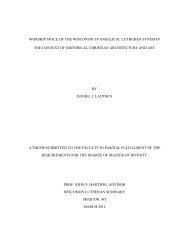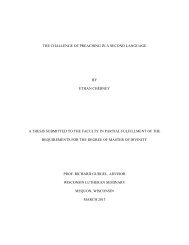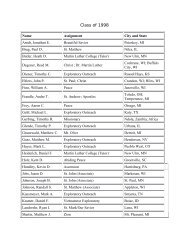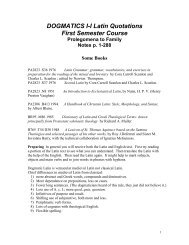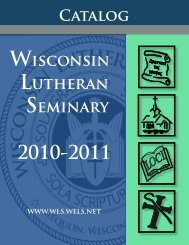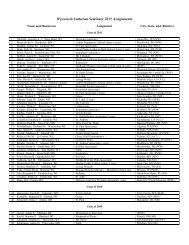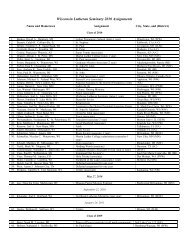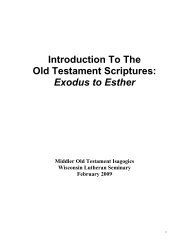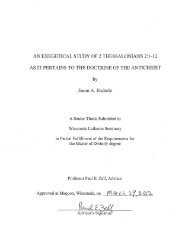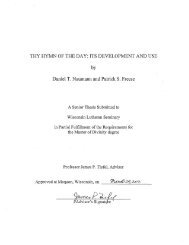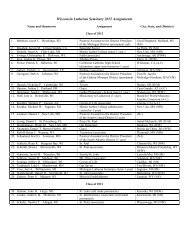Untitled - Wisconsin Lutheran Seminary - WELS
Untitled - Wisconsin Lutheran Seminary - WELS
Untitled - Wisconsin Lutheran Seminary - WELS
Create successful ePaper yourself
Turn your PDF publications into a flip-book with our unique Google optimized e-Paper software.
6. At his second coming, Jesus would completely destroy the Antichrist.<br />
7. The Antichrist would be successful in bringing about the apostasy, because Satan<br />
would support him with miracles to mislead many.<br />
8. Satan would also use his power to lead the Antichrist’s followers to join the man of<br />
sin in denying the truth of salvation.<br />
9. Because of their denial of the truth, God would harden the Antichrist’s followers in<br />
the delusion that they were on the way to salvation when really they were perishing. 23<br />
As some commentators address the words of Paul, many will simply state that this “man<br />
of lawlessness” has not yet arrived but will come at the end, just before Christ comes. Yet some,<br />
after careful study of Paul’s words, came to believe that Paul’s description of the “man of<br />
lawlessness” or the “Antichrist” was fulfilled in their present day. Dr. Martin Luther believed<br />
that the seat of the papacy was the fulfillment of Paul’s description of the “man of lawlessness.”<br />
The <strong>Lutheran</strong> Confessors after him maintained this belief. The current doctrinal stance of <strong>WELS</strong><br />
also follows the belief that the papacy is the “man of lawlessness” which Paul has described.<br />
Through a thorough exegetical study of Paul’s words it the author’s intent to defend the <strong>WELS</strong><br />
doctrine regarding that man of lawlessness, the Antichrist. This study will not only serve as a<br />
defense but also as an application of the warning of the dangers of the Antichrist in the present<br />
time. An exegetical study of 2 Thessalonians 2:1-12 follows.<br />
Paul’s Prayer<br />
The Greek text: 1 Ἐρωτῶμεν δὲ ὑμᾶς, ἀδελφοί, ὑπὲρ τῆς παρουσίας τοῦ κυρίου ἡμῶν Ἰησοῦ<br />
Χριστοῦ καὶ ἡμῶν ἐπισυναγωγῆς ἐπʼ αὐτὸν 24<br />
Author’s translation: 1) But we ask you, brothers, with reference to the coming of our Lord<br />
Jesus Christ and our assembling to him,<br />
It is possible that chapter two begins with a prayer from the pen of the apostle. Paul uses<br />
the verb Ἐρωτῶμεν, which is a present active indicative first person plural form of ἐρωτάω. The<br />
basic meaning of the verb is “to ask or request.” This verb will usually imply and introduce an<br />
underlying question. The verb is used sixty-three times in the New Testament, most of which are<br />
in the gospels, where they are primarily used in dialogue – people asking questions or making<br />
requests. The verb is used in the epistles only a few times (Php 4:3 “I plead”, 1 Th 4:1 “we<br />
23 David P. Kuske, 1,2 Thessalonians (Milwaukee: Northwestern Publishing House, 1984), 90.<br />
24 The Greek text comes from the Nestle-Aland Greek New Testament, 27 th Edition.<br />
12



